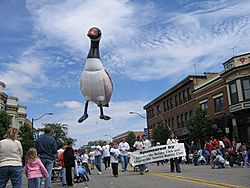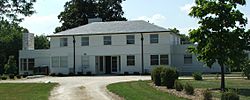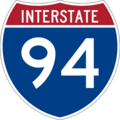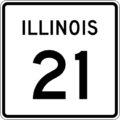Libertyville, Illinois facts for kids
Quick facts for kids
Libertyville, Illinois
|
|||
|---|---|---|---|
|
Village
|
|||
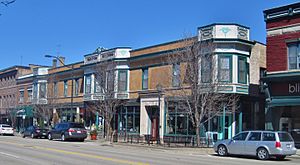
The Proctor Building in Libertyville (1903), taken in March 2013
|
|||
|
|||
| Motto(s):
Fortitudine Vincimus
"By endurance we conquer" |
|||
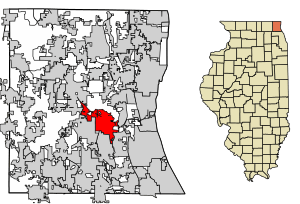
Location of Libertyville in Lake County, Illinois.
|
|||
| Country | United States | ||
| State | Illinois | ||
| County | Lake | ||
| Township | Libertyville | ||
| Area | |||
| • Total | 9.16 sq mi (23.72 km2) | ||
| • Land | 8.81 sq mi (22.81 km2) | ||
| • Water | 0.35 sq mi (0.90 km2) 3.83% | ||
| Elevation | 699 ft (213 m) | ||
| Population
(2020)
|
|||
| • Total | 20,579 | ||
| • Density | 2,336.40/sq mi (902.10/km2) | ||
| Time zone | Central | ||
| Zip Code |
60048
|
||
| Area code(s) | 847/224 | ||
| FIPS code | 17-43250 | ||
| GNIS feature ID | 412036 | ||
Libertyville is a village in Lake County, Illinois, United States. It's a northern suburb of Chicago. The village is about 5 miles west of Lake Michigan and sits along the Des Plaines River. In 2020, about 20,579 people lived there. Libertyville is part of a larger area called Libertyville Township. This township also includes parts of other nearby towns. Libertyville is about 40 miles north of downtown Chicago.
Contents
- Geography of Libertyville
- Libertyville's Population
- History of Libertyville
- Education in Libertyville
- Economy of Libertyville
- Libertyville Library
- Media in Libertyville
- Transportation in Libertyville
- Drinking Water Supply
- Recreation in Libertyville
- Notable People from Libertyville
- Images for kids
- See also
Geography of Libertyville
Libertyville is located at 42.284222° N, 87.960673° W.
Land and Water Areas
The village covers about 9.15 square miles. Most of this area, about 8.81 square miles, is land. The rest, about 0.34 square miles, is water. The Des Plaines River forms most of the eastern border of the village. Other water areas include Butler Lake, Liberty Lake, and Lake Minear.
Getting Around Libertyville
Libertyville's main street is Milwaukee Avenue (also known as Illinois Route 21). If you want to drive to Chicago, you can take Interstate 94. The trip to downtown Chicago usually takes about 45 minutes.
There are also train stations for getting around. The main Metra train station is near downtown Libertyville. It's on the Milwaukee District/North Line, which goes from Union Station in Chicago to Fox Lake. Another Metra station, Prairie Crossing, is shared with Grayslake. This station also serves the North Central Line, which goes from Union Station to Antioch.
Major Roads in Libertyville
 Tri-State Tollway
Tri-State Tollway Milwaukee Avenue
Milwaukee Avenue- Lake Street
 Buckley Road/Peterson Road
Buckley Road/Peterson Road Park Avenue
Park Avenue- Midlothian Road
- Winchester Road
- Butterfield Road
- St. Mary's Road
- Golf Road
Libertyville's Population
| Historical population | |||
|---|---|---|---|
| Census | Pop. | %± | |
| 1880 | 695 | — | |
| 1890 | 550 | −20.9% | |
| 1900 | 864 | 57.1% | |
| 1910 | 1,724 | 99.5% | |
| 1920 | 2,125 | 23.3% | |
| 1930 | 3,791 | 78.4% | |
| 1940 | 3,930 | 3.7% | |
| 1950 | 5,425 | 38.0% | |
| 1960 | 8,560 | 57.8% | |
| 1970 | 11,684 | 36.5% | |
| 1980 | 16,520 | 41.4% | |
| 1990 | 19,174 | 16.1% | |
| 2000 | 20,742 | 8.2% | |
| 2010 | 20,315 | −2.1% | |
| 2020 | 20,579 | 1.3% | |
| U.S. Decennial Census 2010 2020 |
|||
The population of Libertyville has grown a lot over the years. In 1880, there were only 695 people. By 2020, the population had grown to 20,579.
Population Makeup in 2020
The table below shows the different groups of people living in Libertyville. This information comes from the 2020 U.S. Census.
| Race / Ethnicity (NH = Non-Hispanic) | Pop 2000 | Pop 2010 | Pop 2020 | % 2000 | % 2010 | % 2020 |
|---|---|---|---|---|---|---|
| White alone (NH) | 18,812 | 17,777 | 17,061 | 90.70% | 87.51% | 82.90% |
| Black or African American alone (NH) | 209 | 232 | 262 | 1.01% | 1.14% | 1.27% |
| Native American or Alaska Native alone (NH) | 18 | 14 | 14 | 0.09% | 0.07% | 0.07% |
| Asian alone (NH) | 948 | 1,154 | 1,238 | 4.57% | 5.68% | 6.02% |
| Pacific Islander alone (NH) | 6 | 4 | 4 | 0.03% | 0.02% | 0.02% |
| Other race alone (NH) | 13 | 16 | 55 | 0.06% | 0.08% | 0.27% |
| Mixed race or Multiracial (NH) | 170 | 282 | 759 | 0.82% | 1.39% | 3.69% |
| Hispanic or Latino (any race) | 566 | 836 | 1,186 | 2.73% | 4.12% | 5.76% |
| Total | 20,742 | 20,315 | 20,579 | 100.00% | 100.00% | 100.00% |
History of Libertyville
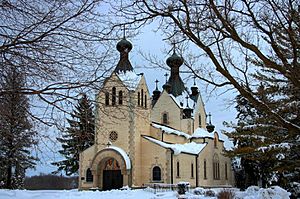
The land where Libertyville is now was once home to the Illinois River Potawatomi Native Americans. In 1829, they sold their land to the U.S. government. They received $12,000 in cash and goods, plus salt every year.
By the mid-1830s, the Potawatomi had left. In 1835, the first non-Native American, George Vardin, moved to the area. He was an English immigrant who lived in a cabin. This cabin was located where the Cook Park library is today. The settlement was first called Vardin's Grove.
Changing Names of Libertyville
In 1836, the community decided to call itself Independence Grove. This was to celebrate 60 years since the U.S. Declaration of Independence. In 1837, the town got its first doctor, Jesse Foster, and then its first lawyer, Horace Butler. Butler Lake is named after him. A post office opened, but the name had to change. There was another Independence Grove in Illinois. So, on April 16, 1837, the new post office was named Libertyville.
The town's name changed again in 1839 to Burlington. This happened when it became the county seat of Lake County. But in 1841, the county seat moved to Little Fort (now Waukegan). So, the name went back to Libertyville, and it has stayed that way ever since.
Important Buildings and Growth
Libertyville's most famous building is the Cook Mansion. Ansel Brainerd Cook, a builder and politician from Chicago, built it in 1879. It was near where Vardin's cabin once stood. Cook used the mansion as his summer home and a horse farm. The building was changed in 1921 to become the town library. It now looks like a Colonial-style building with pillars. Today, it's a museum run by the Libertyville-Mundelein Historical Society.
The community grew quickly when a train line reached Libertyville in 1881. This led to the village officially becoming incorporated in 1882. John Locke was the first village president.
In 1895, a fire destroyed much of downtown Libertyville. The village decided that new buildings had to be made of brick. This is why the downtown area looks so similar today. The National Trust for Historic Preservation praised Libertyville's downtown. They called it a place where people still enjoy walking around. It has old-fashioned shops next to modern ones. There's also a Farmer's Market from June to October.
Samuel Insull, who started Commonwealth Edison, bought land south of Libertyville in 1906. He called his large property Hawthorn-Mellody Farms. He also bought an electric train line that connected Lake Bluff to Libertyville. When Insull lost his money during the Great Depression, parts of his land were bought by famous Chicagoans like Adlai Stevenson and John F. Cuneo. Cuneo's home is now the Cuneo Museum.
A Royal Burial Site
From 1970 to 2013, Libertyville was the burial place of Peter II of Yugoslavia. He was the only European king ever buried in the United States. He died in exile in Denver. In 2013, his remains were moved from St. Sava Serbian Orthodox Monastery. They were sent back to Serbia for burial in the Royal Family Mausoleum at Oplenac.
Education in Libertyville
Libertyville has several schools for its students.
Libertyville School District 70
This district has four public elementary schools and one public middle school within Libertyville:
- Adler Park Elementary School
- Butterfield Elementary School
- Copeland Manor Elementary School
- Rockland Elementary School
- Highland Middle School
Hawthorn School District 73
Students who live south of Golf Road go to Hawthorn District 73 schools. These schools are located in Vernon Hills.
Oak Grove School District 68
Students living along Buckley Road attend Oak Grove Grade School. This school is in nearby Green Oaks.
Libertyville High School
Libertyville High School serves students from Libertyville and other nearby communities. It is part of Community High School District 128. Some students living south of Golf Road can choose between Libertyville High School and Vernon Hills High School.
Other Schools
There are also private schools in Libertyville. St. Joseph Elementary School (Catholic) and St. John's Lutheran School (Wisconsin Evangelical Lutheran Synod) offer education for Pre-K through 8th grade. The St. Sava Monastery also has the St. Sava Serbian Orthodox School of Theology.
Economy of Libertyville
Libertyville has many businesses that provide jobs for its residents.
Top Employers in Libertyville
Here are the top employers in Libertyville as of April 30, 2020:
| # | Employer | # of Employees |
|---|---|---|
| 1 | Advocate Condell Medical Center | 2,102 |
| 2 | Hollister Incorporated | 527 |
| 3 | Volkswagen Credit | 446 |
| 4 | Avexis | 407 |
| 5 | Medline Industries | 343 |
| 6 | Libertyville District 70 | 326 |
| 7 | Fabrication Technologies | 307 |
| 8 | Commonwealth Edison | 278 |
| 9 | Snap-on Credit | 242 |
| 10 | Community High School District 128 | 239 |
Libertyville Library
Libertyville is part of the Cook Memorial Public Library District. The Cook Park library is one of the district's two main buildings. It is located on Cook and Brainerd streets. The library was first in the Cook Mansion. Ansel B. Cook's wife, Emily, gave the property to the village in 1920 to be used as a library. In 1968, a large addition was built next to the mansion. In 2011, another addition was completed, making the library even bigger.
Media in Libertyville
The Libertyville Review newspaper covers news about Libertyville. It is published by Pioneer Press. Other larger newspapers sometimes have stories about Libertyville. These include the Chicago Tribune, Daily Herald, and Lake County News-Sun.
Transportation in Libertyville
Libertyville has train stations for easy travel. There is a station on Metra's North Central Service line at Prairie Crossing. There are also two stations on Metra's Milwaukee District North Line. This line connects Fox Lake to Union Station in Chicago. One of these stations shares a driveway with the North Central Service station.
Pace also provides bus service in Libertyville. Route 574 connects Libertyville to Grayslake and other places.
Drinking Water Supply
Libertyville gets its drinking water from the Central Lake County Joint Action Water Agency (CLCJAWA). This agency is in Lake Bluff. CLCJAWA cleans water from Lake Michigan so it's safe to drink.
Recreation in Libertyville
Libertyville offers many places for fun and outdoor activities:
- Pools: Adler Pool, Riverside Pool
- Golf courses: Merit Club
- Lakes: Lake Minear, Butler Lake, Independence Grove, Liberty Lake
- Parks: Adler, Cook, Sunrise Rotary, Charles Brown, Riverside, Butler Lake, Nicholas-Dowden, Independence Grove, Blueberry Hill, Paul Neal, Greentree, Jo Ann Eckmann, Gilbert Stiles.
Notable People from Libertyville
Many interesting people have lived in or are connected to Libertyville.
- David Adler, a famous architect.
- Marlon Brando, an actor who won an Academy Award.
- Julia Cameron, a writer and artist, known for The Artist's Way.
- Phil Collins, a Libertyville trustee.
- Marietta DePrima, an actress.
- Bill Heck, an actor.
- Donna Johnson, the first African-American mayor of Libertyville.
- Jo Jorgensen, a political candidate.
- Marissa Lingen, a writer who was born here.
- Richard J. Lyons, an Illinois state representative and lawyer.
- Mary Morello, who helped start a group called Parents for Rock and Rap.
- Jim Naureckas, an editor and writer.
- Zak Orth, an actor in movies and TV.
- Alicia Patterson, an editor and publisher who started Newsday.
- Cissy Patterson, a publisher.
- George F. Pond, a Civil War hero who received the Medal of Honor.
- Gwynne Shotwell, President and Chief Operating Officer of SpaceX.
- Phillipa Soo, an actress who played Elizabeth Schuyler in the musical Hamilton.
- Adlai Stevenson, who was the Governor of Illinois. He ran for President twice. His home is now a National Historic Landmark.
- Mark Suppelsa, a TV news anchor.
- Peter II of Yugoslavia, a king who was buried in Libertyville until 2013.
Music Artists from Libertyville
- Jim Broustis, guitarist for the band X-tal.
- MC chris, a rapper and voice actor.
- Maureen Herman, bassist for the band Babes in Toyland.
- Adam Jones, guitarist for the band Tool.
- Tom Morello, guitarist for bands like Rage Against the Machine and Audioslave.
- Ike Reilly, an indie rock musician.
Sports Figures from Libertyville
- Cedric Benson, a former football running back.
- Mark Bortz, a former football guard.
- Brett Butler, a former baseball center fielder and All-Star.
- Rashied Davis, a former football wide receiver.
- Roberto Garza, a former football center.
- Marshall Hollingsworth, a professional soccer player.
- Baggio Hušidić, a former professional soccer player.
- Charles Leno, a football offensive tackle.
- Mike Marshall, a former baseball right fielder and All-Star.
- Steve Novak, a former basketball forward.
- Drew Peterson, a basketball small forward.
- Ted Phillips, a former president of the Chicago Bears football team.
- Adam Podlesh, a former football punter.
- Evan Skoug, a former minor league baseball player.
- Dick Stanfel, a former football offensive guard and coach.
- Frank Thomas, a former baseball first baseman for the Chicago White Sox and two-time MVP.
- Laura Zeng, a former American rhythmic gymnast.
Images for kids
See also
 In Spanish: Libertyville (Illinois) para niños
In Spanish: Libertyville (Illinois) para niños
 | William M. Jackson |
 | Juan E. Gilbert |
 | Neil deGrasse Tyson |



